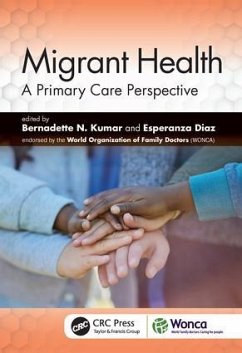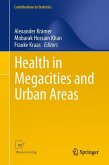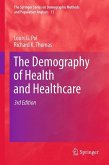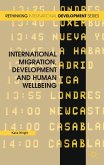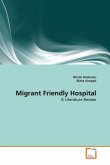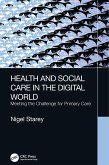Migrant Health
A Primary Care Perspective
Herausgeber: Kumar, Bernadette N.; Diaz, Esperanza
Migrant Health
A Primary Care Perspective
Herausgeber: Kumar, Bernadette N.; Diaz, Esperanza
- Gebundenes Buch
- Merkliste
- Auf die Merkliste
- Bewerten Bewerten
- Teilen
- Produkt teilen
- Produkterinnerung
- Produkterinnerung
This accessible book has been carefully crafted to enable primary health care professionals to develop the skills and competencies required to deliver appropriate services to this diverse group of patients and, in turn, to ensure equity in health care for all.
Andere Kunden interessierten sich auch für
![Health in Megacities and Urban Areas Health in Megacities and Urban Areas]() Health in Megacities and Urban Areas106,99 €
Health in Megacities and Urban Areas106,99 €![The Demography of Health and Healthcare The Demography of Health and Healthcare]() Louis G. PolThe Demography of Health and Healthcare161,99 €
Louis G. PolThe Demography of Health and Healthcare161,99 €![International Migration, Development and Human Wellbeing International Migration, Development and Human Wellbeing]() Katie WrightInternational Migration, Development and Human Wellbeing37,99 €
Katie WrightInternational Migration, Development and Human Wellbeing37,99 €![Migrant architects of the NHS Migrant architects of the NHS]() Julian SimpsonMigrant architects of the NHS135,99 €
Julian SimpsonMigrant architects of the NHS135,99 €![Migrant Friendly Hospital Migrant Friendly Hospital]() Nicole KoskinenMigrant Friendly Hospital32,99 €
Nicole KoskinenMigrant Friendly Hospital32,99 €![Health and Social Care in the Digital World Health and Social Care in the Digital World]() Nigel StareyHealth and Social Care in the Digital World249,99 €
Nigel StareyHealth and Social Care in the Digital World249,99 €![Men's Health 4e Men's Health 4e]() Men's Health 4e314,99 €
Men's Health 4e314,99 €-
-
-
This accessible book has been carefully crafted to enable primary health care professionals to develop the skills and competencies required to deliver appropriate services to this diverse group of patients and, in turn, to ensure equity in health care for all.
Hinweis: Dieser Artikel kann nur an eine deutsche Lieferadresse ausgeliefert werden.
Hinweis: Dieser Artikel kann nur an eine deutsche Lieferadresse ausgeliefert werden.
Produktdetails
- Produktdetails
- Verlag: CRC Press
- Seitenzahl: 338
- Erscheinungstermin: 26. Juli 2019
- Englisch
- Abmessung: 250mm x 175mm x 23mm
- Gewicht: 764g
- ISBN-13: 9781138498051
- ISBN-10: 113849805X
- Artikelnr.: 57045319
- Herstellerkennzeichnung
- Produktsicherheitsverantwortliche/r
- Europaallee 1
- 36244 Bad Hersfeld
- gpsr@libri.de
- Verlag: CRC Press
- Seitenzahl: 338
- Erscheinungstermin: 26. Juli 2019
- Englisch
- Abmessung: 250mm x 175mm x 23mm
- Gewicht: 764g
- ISBN-13: 9781138498051
- ISBN-10: 113849805X
- Artikelnr.: 57045319
- Herstellerkennzeichnung
- Produktsicherheitsverantwortliche/r
- Europaallee 1
- 36244 Bad Hersfeld
- gpsr@libri.de
Bernadette N. Kumar leads the Migration Health work package of the EU Joint Action on Health Inequalities and is the current President of the EUPHA section of Migration and Ethnic Minority Health. She was appointed Director of NAKMI (Norwegian Center for Migration and Minority Health, now part of the Norwegian Institute of Public Health) in 2010 and Associate Professor, Global Health at the Institute for Health and Society, University of Oslo in 2013. She has also been a commissioner of the Lancet Commission on Migration and Health. Esperanza Diaz is a Specialist in Primary Care. She works as Associate Professor in the Department of Global Public Health and Primary Care, University of Bergen, and is a Senior Researcher at the Unit for Migration and Health, Norwegian Institute of Public Health, Norway.
Section I: Overarching Themes. 1. Migration and migrants: What we know
about worldwide mobility and why it matters. 2. Migration health theories:
Healthy migrant effect and allostatic load. Can both be true? 3. Culture,
language and the clinic - Three stories, two keys. 4. The ethics of migrant
health: Power and privilege versus rights and entitlements. 5.
Discrimination and health. 6. Migrants' use of primary health care
services: Overuse, underuse, or both? Section II: A Life-Course
Perspective. 7. A life-course perspective on migrant health. 8. Promoting
the health of migrant children and children of migrants. 9. Adolescent
migrant health. 10. Health care for older and elderly migrants. 11. Family
and group as a unit of care. Section III: Health Challenges at the Clinic.
12. Health challenges at the clinic. 13. Gynaecology and obstetrics. 14.
Chronic disease prevention and management: An understated priority. 15.
Understanding unexplained and complex symptoms and diseases. 16. Cancer
among migrant patients. 17. Migration and mental health. 18.
Multimorbidity: The complexity. Section IV: Opportunities and Tools. 19.
Opportunities and tools when meeting migrant patients. 20. Bridging
cultural and language discordance. 21. Evidence-based guidelines and
advocacy. 22. Diversity-sensitive versus adapted services for migrants: The
example of dementia care in Germany. 23. Assessment tools for dementia and
depression in older migrants. 24. Community participation in primary health
care: Meaningful involvement of migrants.
about worldwide mobility and why it matters. 2. Migration health theories:
Healthy migrant effect and allostatic load. Can both be true? 3. Culture,
language and the clinic - Three stories, two keys. 4. The ethics of migrant
health: Power and privilege versus rights and entitlements. 5.
Discrimination and health. 6. Migrants' use of primary health care
services: Overuse, underuse, or both? Section II: A Life-Course
Perspective. 7. A life-course perspective on migrant health. 8. Promoting
the health of migrant children and children of migrants. 9. Adolescent
migrant health. 10. Health care for older and elderly migrants. 11. Family
and group as a unit of care. Section III: Health Challenges at the Clinic.
12. Health challenges at the clinic. 13. Gynaecology and obstetrics. 14.
Chronic disease prevention and management: An understated priority. 15.
Understanding unexplained and complex symptoms and diseases. 16. Cancer
among migrant patients. 17. Migration and mental health. 18.
Multimorbidity: The complexity. Section IV: Opportunities and Tools. 19.
Opportunities and tools when meeting migrant patients. 20. Bridging
cultural and language discordance. 21. Evidence-based guidelines and
advocacy. 22. Diversity-sensitive versus adapted services for migrants: The
example of dementia care in Germany. 23. Assessment tools for dementia and
depression in older migrants. 24. Community participation in primary health
care: Meaningful involvement of migrants.
Section I: Overarching Themes. 1. Migration and migrants: What we know
about worldwide mobility and why it matters. 2. Migration health theories:
Healthy migrant effect and allostatic load. Can both be true? 3. Culture,
language and the clinic - Three stories, two keys. 4. The ethics of migrant
health: Power and privilege versus rights and entitlements. 5.
Discrimination and health. 6. Migrants' use of primary health care
services: Overuse, underuse, or both? Section II: A Life-Course
Perspective. 7. A life-course perspective on migrant health. 8. Promoting
the health of migrant children and children of migrants. 9. Adolescent
migrant health. 10. Health care for older and elderly migrants. 11. Family
and group as a unit of care. Section III: Health Challenges at the Clinic.
12. Health challenges at the clinic. 13. Gynaecology and obstetrics. 14.
Chronic disease prevention and management: An understated priority. 15.
Understanding unexplained and complex symptoms and diseases. 16. Cancer
among migrant patients. 17. Migration and mental health. 18.
Multimorbidity: The complexity. Section IV: Opportunities and Tools. 19.
Opportunities and tools when meeting migrant patients. 20. Bridging
cultural and language discordance. 21. Evidence-based guidelines and
advocacy. 22. Diversity-sensitive versus adapted services for migrants: The
example of dementia care in Germany. 23. Assessment tools for dementia and
depression in older migrants. 24. Community participation in primary health
care: Meaningful involvement of migrants.
about worldwide mobility and why it matters. 2. Migration health theories:
Healthy migrant effect and allostatic load. Can both be true? 3. Culture,
language and the clinic - Three stories, two keys. 4. The ethics of migrant
health: Power and privilege versus rights and entitlements. 5.
Discrimination and health. 6. Migrants' use of primary health care
services: Overuse, underuse, or both? Section II: A Life-Course
Perspective. 7. A life-course perspective on migrant health. 8. Promoting
the health of migrant children and children of migrants. 9. Adolescent
migrant health. 10. Health care for older and elderly migrants. 11. Family
and group as a unit of care. Section III: Health Challenges at the Clinic.
12. Health challenges at the clinic. 13. Gynaecology and obstetrics. 14.
Chronic disease prevention and management: An understated priority. 15.
Understanding unexplained and complex symptoms and diseases. 16. Cancer
among migrant patients. 17. Migration and mental health. 18.
Multimorbidity: The complexity. Section IV: Opportunities and Tools. 19.
Opportunities and tools when meeting migrant patients. 20. Bridging
cultural and language discordance. 21. Evidence-based guidelines and
advocacy. 22. Diversity-sensitive versus adapted services for migrants: The
example of dementia care in Germany. 23. Assessment tools for dementia and
depression in older migrants. 24. Community participation in primary health
care: Meaningful involvement of migrants.

